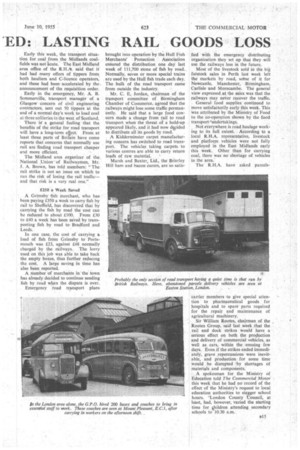rED: LASTING RAIL GOODS LOSS
Page 49

If you've noticed an error in this article please click here to report it so we can fix it.
Early this week, the transport situation for coal from the Midlands coalfields was not acute. The East Midland area office of the R.H.At. said that it had had many offers of tippers from both hauliers and C-licence operators, and these had been accelerated by the announcement of the requisition order.
Early in the emergency, Mr. A. B. Sommerville, transport manager of a Glasgow concern of civil engineering contractors, sent out 50 tippers at the end of a normal day's work to load coal at three collieries in the west of Scotland.
There ie a general feeling that the benefits of the strike for road transport will have a long-term etiect. From at least three parts of Bri&in have come reports that concerns that normally use rail are finding road transport cheaper and more efficient.
The Midland area organizer of the National Union of Railwaymen, Mr. I. A. Brown, has told members: " The rail strike is not an issue on which to run the risk of losing the rail traffic— and that risk is a very real one."
£250 a Week Saved A Grimsby fish merchant, who has been paying £350 a week to carry fish by rail to Sheffield, has discovered that by carrying the fish by road the cost can be. reduced to about £100. From £30 to £40 a week has been saved by transporting fish by road to Bradford and Leeds.
In one case, the cost of carrying a load of fish from Grimsby to Portsmouth was £23, against £48 normally charged by the railways. The lorry used on this job was able to take back the empty boxes, thus further reducing the cost. A large saving in time has also been reported.
A number of merchants in the town has already decided to continue sending fish by road when the dispute is over.
Emergency road transport plans brought into operation by the Hull Fish Merchants' Protection Association ensured the distribution one day last week of 111,700 stone of fish by road. Normally, seven or more special trains are used by the Hull fish trade each day. The bulk of the road transport came from outside the industry.
Mr. C. E. Jordan, chairman of the transport committee of Birmingham Chamber of Commerce. agreed that the railways might lose some traffic permanently. He said that a large food concern made a change from rail to road transport when the threat of a hold-up appeared likely, and it had now diFided to distribute all its goods by road.
A Kidderminster carpet manufacturing concern has switched to road transport. The vehicles taking carpets to various centres are able to carry return loads of raw material. '
Marsh and Baxter, Ltd., the Brierley Hill ham and bacon curers, are so satis
fied with the emergency distributing organization they set up that they will use the railways less in the future.
Most of the livestock sold in the big fatstock sales in Perth last week left the markets by road, sotne of it for Newcastle, Manchester, Birmingham, Carlisle and Morecambe. The general view expressed at the sales was that the railways may never recover the traffic.
Generalfood supplies continued to move satisfactorily early this week. This was attributed by the Ministry of Food to the co-operation shown by the food transport "undertakings.
Not everywhere is road haulage working to its full extent. According to a local R.H.A. representative, livestock and platform vehicles were not fully employed in the East Midlands early this week. Other than for carrying coal, there was no shortage of vehicles in the area.
The R.H.A. have asked parcels carrier members to give special attention to pharmaceutical goods for hospitals and to spare parts required for the repair and maintenance of agricultural machinery.
Sir William Rootes, chairman of the Rootes Group, said last week that the rail and dock strikes would have a serious effect on both the procluction and delivery of commercial vehicles, as well as cars, within the ensuing few days. Even if the strikes ended immediately, grave repercussions were inevitable, and production for some time would be disrupted by shortages of materials and components.
A spokesman for the Ministry of Education told The Commercial Motor this week that he had no record of the effect of the Ministry's request to local education authorities to stagger school hours. 'London County touncil, at least, had, however, varied the starting time for ihildren attending secondary schools to 10.30 a.m.




























































































































































